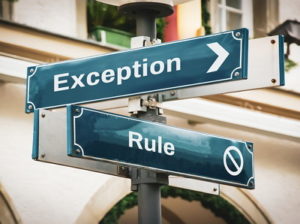 If you’ve done even a small bit of betting over the years then there’s a good chance that you’ll have heard the phrase ‘related contingency’. Essentially, this is when the outcome of bets are linked together and therefore you tend not to be able to place a combined wager on them. If the result of one event can be directly linked to how another bet works out then most bookmakers won’t let you place them as one bet in a multiple.
If you’ve done even a small bit of betting over the years then there’s a good chance that you’ll have heard the phrase ‘related contingency’. Essentially, this is when the outcome of bets are linked together and therefore you tend not to be able to place a combined wager on them. If the result of one event can be directly linked to how another bet works out then most bookmakers won’t let you place them as one bet in a multiple.
Looking at an example such as the FA Cup, you wouldn’t be able to place a Double on both the winner of the semi-final and the outright winner because those two events are inescapably linked. Bookmakers will sometimes offer markets that allow you to get around the related contingency problem, with examples being the likes of Scorecast, Wincast and Bet Builders. You can only place these with specific bookies, though, and you are limitted on the markets you can combine.
Related Contingencies Explained
 A contingency is a future event that cannot be predicted, which is obviously another way of saying ‘something that you might bet on’. If they are related in some way and the outcome of one will directly affect another, it’s not uncommon for a bookmaker to refuse to allow you to add the bet to your coupon. Even if a bookmaker did take the bet by accident, such as in a high street shop, it almost certainly won’t be paid out, or at least at those odds.
A contingency is a future event that cannot be predicted, which is obviously another way of saying ‘something that you might bet on’. If they are related in some way and the outcome of one will directly affect another, it’s not uncommon for a bookmaker to refuse to allow you to add the bet to your coupon. Even if a bookmaker did take the bet by accident, such as in a high street shop, it almost certainly won’t be paid out, or at least at those odds.
The rule on related contingencies normally applies mainly to accumulators and other multiples, such as Lucky 15’s. This is because an accumulator asks you to add several wagers to your betting slip and all of them will need to come in in order for your bet to be a winner. Going back to the FA Cup example, if a team was to win the semi-final then there would obviously be an increased chance that they could win the competition as a whole, so they are related results.
Another example of a related contingency is betting on a team to win the final and betting on them winning 2-0. The results are linked together, with a 2-0 win automatically meaning that they’ll win the competition. You could place them as separate bets, but you wouldn’t be allowed to place them as an accumulator. Of course, both of these are quite obvious examples and not all related contingencies are so clear.
A bookmaker is likely to assume that a successful team will keep winning, so it’s unlikely that they would allow an accumulator bet on a team to win, say, the FA Cup, the League Cup and the Premier League title. It might not seem like they are linked in the same way as previous examples, but bookies will act as if they are for betting purposes because of the idea that success breeds success and winning teams will keep winning.
Ways Around Related Contingency Rules
 Bookmakers do offer punters a way of skipping the rules stopping related contingencies, but they’ve got to provide certain markets and tools. They do this by offering their own markets, with football examples being the likes of Scorecast, Wincast, Anycast and Bet Builders. It’s not just football matches that such bets are available for, but they’re a good example of how they work. Each type of ‘cast’ bet combines two markets that would otherwise be related.
Bookmakers do offer punters a way of skipping the rules stopping related contingencies, but they’ve got to provide certain markets and tools. They do this by offering their own markets, with football examples being the likes of Scorecast, Wincast, Anycast and Bet Builders. It’s not just football matches that such bets are available for, but they’re a good example of how they work. Each type of ‘cast’ bet combines two markets that would otherwise be related.
A Wincast, for example, will ask you which player you think will score first and which team will win the match. If you like betting on horse racing then Full Cover bets will do a job for you by offering the likes of a 4-fold, four Trebles, and six Doubles in the same single bet. The difference being that these are multiple bets and therefore need you to pay multiple stakes for the bet to be placed and potentially become a winner.
Request A Bet & Other Specials
 In the age of social media, it has become more common for bookmakers to allow punters to request their own bets. These can contain related contingencies, so bettors will often request things that they wouldn’t have been allowed to place otherwise. You could tweet your favourite bookie and ask them for odds on a team to win the FA Cup, the League Cup and the Premier League title, say, knowing you couldn’t place that as a standard accumulator.
In the age of social media, it has become more common for bookmakers to allow punters to request their own bets. These can contain related contingencies, so bettors will often request things that they wouldn’t have been allowed to place otherwise. You could tweet your favourite bookie and ask them for odds on a team to win the FA Cup, the League Cup and the Premier League title, say, knowing you couldn’t place that as a standard accumulator.
The joy of Request A Bet features is that they allow you to bet on pretty much anything, provided the bookie in question will give you odds. The chances of them doing so are high, given the fact that such wagers usually allow them to offer you odds that aren’t anywhere near what they actually should be. Bookmakers know that if you’ve requested a weird bet then you won’t be able to shop around, so they’ll give you whatever they want and know you’ll have to like it or lump it.
What About The Odds?
 This is an important consideration as you will immediately notice the odds for related contingencies are a lot lower than they would be for a non-related accumulator.
This is an important consideration as you will immediately notice the odds for related contingencies are a lot lower than they would be for a non-related accumulator.
Let’s take two example where you back a 2-0 correct score and Jimmy Jones as the first goalscorer in the same game. Individually the odds might be something like 5/1 for the correct score and 5/1 for the first goalscorer. In an straight double the overall odds of this bet would be 35/1 but a comparable scorecast bet may be more like 10/1.
Related contingency markets are useful if you have a very precise idea of how a game or event is going to play out as it can increase the odds vs a single bet. These bets however have very high margins for bookmakers, partly because the bets are more complex and it means they cannot balance that market easily.
Generally for value related contingency markets should be avoided unless you think there is a real possibility it will win. You can always tell the markets that bookies make the most money on as they push them with enhanced odds and offers and it is very common to see related bets pushed by companies.
